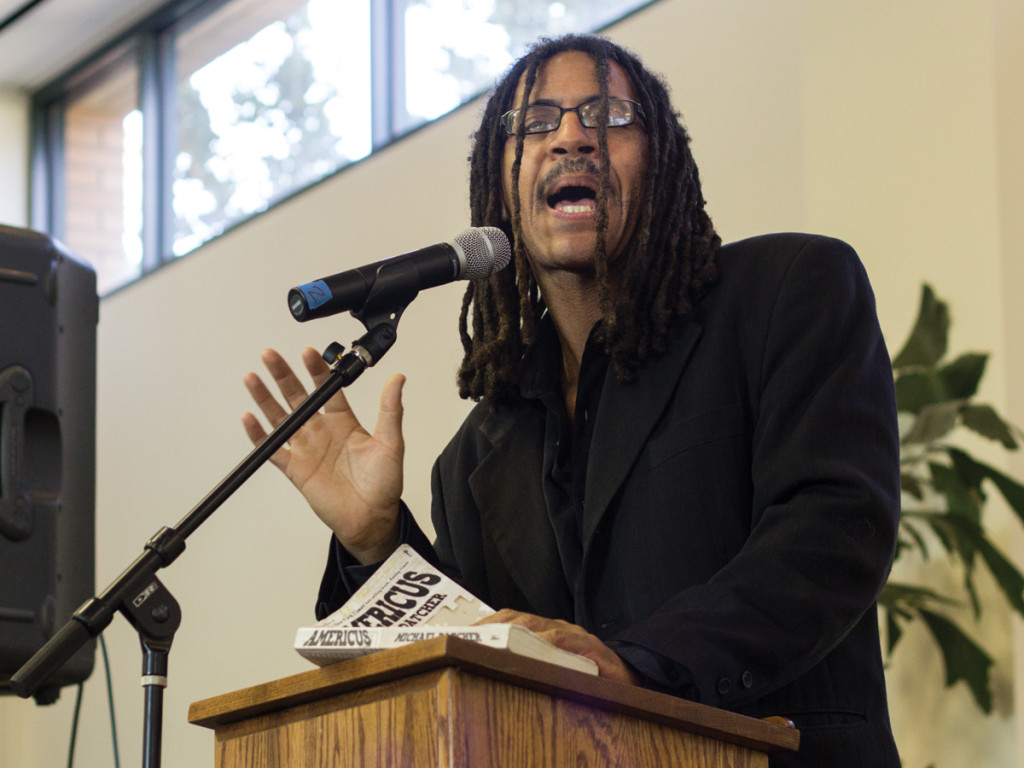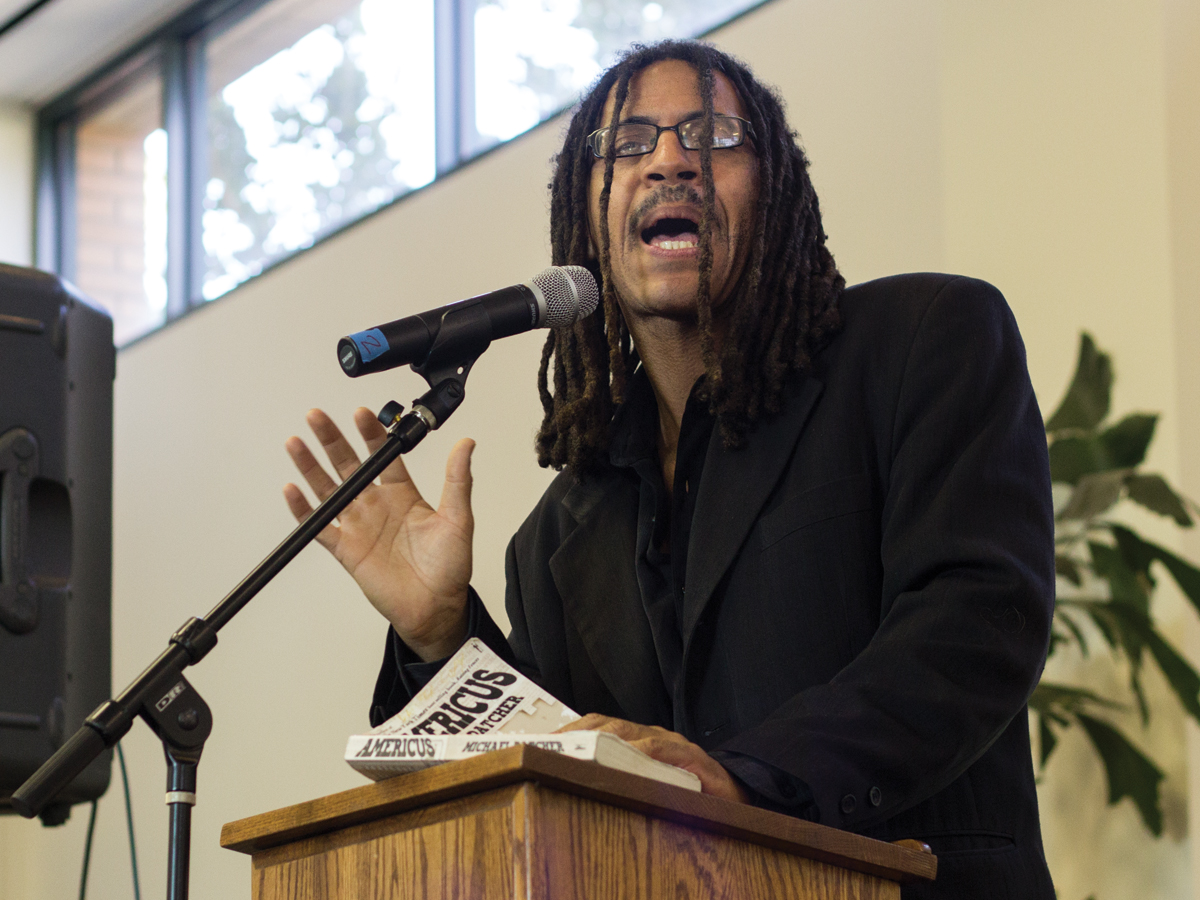
Claudia Rankine, Keynote speaker
Literature enthusiasts and members of academia filled the chairs and couches in the UCR Bookstore Lounge last Monday to witness the award-winning poet, Claudia Rankine, share and discuss her work. Her most recent publication, “Citizen: An American Lyric” — a finalist for the 2014 National Book Award in Poetry and sequel to “Don’t Let Me Be Lonely: An American Lyric” — combines poetry, prose and images to communicate to readers the ways in which racism still pervades our society. An amazing speaker, Rankine used anecdotes to not only provide an informative background to her poems, but also kept the crowd engaged. One of her pieces of writing in “Citizen: An American Lyric” tells the story of a friend who attempts to bridge the divide between her and the African-American community through her instinctual eagerness to fill an empty seat next to a black man. Not only a poet, but also a professor at Pomona College, Rankine had something to share with each and every one of the audience members as she answered questions about how to engage a diverse classroom of students, and why second-person narrative allows her writing to speak to the collective audience about race and racism.
Tod Goldberg
The first full day of Writer’s Week got off to a slow start, with eager students beginning to doze off in the afternoon sun once the announcement was made that the speaker would be slightly late. Onlookers didn’t have to wait long, though — little more than five minutes later, Tod Goldberg strutted into the room, cracking the ambient buzz with a loud, “Wake up, this will be on the final!”
That entrance would be emblematic of the rest of his talk, as he told humorous anecdotes about writing and explained where he received his inspiration with an infectious energy. Goldberg’s specialty is the crime thriller, and he has written original novels based on the popular television series “Burn Notice,” in addition to his source material for the day, the novel “Gangsterland.” The book tells the story of a gang member forced to take up the life of a rabbi to avoid arrest, and gripped the audience with its visceral details and moral quandaries faced by the main character. “Good stories are about bad people,” Goldberg remarked, saying that he wanted to “demystify the bad guy,” and encouraged writers to let readers see the human side of violence in their works.
Steph Cha
Law student-turned-writer Steph Cha spoke to UCR about her novels and writing techniques for the second day of Writer’s Week. Cha studied English and East Asian Studies in college before going to law school. Although she passed the bar exam, Cha decided that she wanted to dedicate her life to writing. She released her debut novel, “Follow Her Home,” in April 2013 and her second novel “Beware, Beware” in August 2014. Cha read an excerpt from “Beware, Beware,” a Hollywood murder mystery, and proceeded to speak on the importance of character development. “The more you do to a character, the less you can use them in different situations,” Cha said. Currently working on her third novel, Cha elaborated on her writing process. “Setting deadlines and having structure is definitely useful,” Cha explained. When she isn’t working on her novel, she writes extensive Yelp reviews and writes as a freelance writer for the Los Angeles Times.
Josh Emmons
Josh Emmons has published two novels, “The Loss of Leon Meed” and “Prescription for a Superior Existence,” and is currently working on his third novel and short story collection. His novels have been translated to several languages and have been recognized in an array of magazines and newspapers such as “The New York Times Book Review” and “The American Scholar.”
Highlanders had the pleasure of becoming acquainted with Emmons as he readily began reading his short story, “A Moral Tale.” He related the details of his story as he explained that it was highly based on Eric Rohmer’s film, “My Night at Maud’s.” Similar to Rohmer’s movie, Emmons’ story takes place in France, where a middle-aged man, Bernard, finds himself caught between two women. He discussed how his strong interest in the “dynamic of self-denial” through the “situation of temptation” and discovery of the will to resist it led him to the idea of this short story. He was able to throw himself into the depths of the passage by introducing a “20-something French woman living alone,” stating that he would have become her if he had continued his high school path. Though the main concept was borrowed from Rohmer’s film, Emmons made certain that his story still demonstrated a reflection of himself, revealing that finding one’s self in their written work is the most important aspect of being an author.
Katie Ford & Allison Benis White
The duo of Katie Ford and Allison Benis White took to the podium to read aloud selections from their poetry compilations that silenced the audience with their raw emotional power. Both UCR creative writing professors, each took turns reading, with Ford’s voice softly rumbling over the rolling r’s in her “Blood Lyrics” and White’s murmurs emphasizing the euphonic sounds in “Self-Portrait with Crayon.” The melody masked the heartrending nature of the poems themselves — “Blood Lyrics” is tormented by motherly worry over her young daughter, while “Self-Portrait with Crayon” is marked by a daughter’s struggles with the absence of a mother. When the two finish, White says the two at first hadn’t intended to alternate readings, joking that writers are lonely creatures. But, she says, “to put work together that never thought to be together” is one of the fun parts of being a writer, and opens the door to new messages and ideas altogether.
Mike Davis & Juan Felipe Herrera
Students filled the third floor of the HUB to listen to two greatly accomplished UCR lecturers, Mike Davis and Juan Felipe Herrera.
Davis read excerpts from his book “In Praise of Barbarians: Essays against Empire,” speaking within the realm of academia that he’s most known for: examining historical injustices committed by the state. A longtime commenter of political injustices in his fiction and nonfiction, Davis largely spoke of the dangers of historical revisionism concerning civil rights, talking slowly as though he were reciting old war stories to a family around the dinner table.
Next came Juan Felipe Herrera. Speaking toward the crowd in his regular fast-paced demeanor, Herrera read from his poem “Saturday Night at the Buddhist Cinema,” which strangely was not a poem found in the poetry collection being sold at the reading, “A Book of Lives.” While this might seem strange — reading a poem not found in the book being sold — it could also be seen as typical Herrera: funny, quirky, at odds with the expectations of listeners. Herrera also employed a few more techniques, such as ad-libbing his own spoken poetry apart from “Saturday Night at the Buddhist Cinema,” and conducting the crowd into a call-and-response musical chant, mixed with whatever poetry he was currently reading with whatever came to his mind. And like most times where one sits and listens to Herrera speak poetry, it might’ve been difficult to follow, but there’s no denying there was a magic to it.
Ernest Hogan
UCR’s own Nalo Hopkinson opened for Chicano writer Ernest Hogan with a brief description of the author, but Hogan dove right into his story, “Burrito Meltdown,” a short story within a collection of “Sci-Fi, Mexican stories,” as Hogan described, in his book “Angel Body and Magic for the Soul.” The story illustrated the tale of aliens abiding by stereotypes to assimilate with the Latino population. “‘I can’t pass as a Hispanic …’ ‘That’s okay, we have a tanning bed in the back,’” Hogan read. He paused for the few chuckles from the back as he brought each character’s voice to life. Aspiring writers and eager listeners were captivated by the description of the galaxy and characters. Biting back snickers, many were hesitant to laugh at the racial jokes he presented. As he wrapped up his reading, he noted, “Many of these quotes are from people that have said this around me.”
He stayed to sign books — with a complimentary doodle with each. He explained how his collection embodied the same themes: racism, stereotypes and how he uses each to “create satire.” His inspiration is derived from the raids of churches in his old neighborhood and most of his characters are based on actual people.
Ching-In Chen
Self-described poet-activist Ching-In Chen radiated with sheer power before the seated crowd, with bold, vigorous readings from the collection of poetry at the podium that declared the poet’s sense of self to the world. Holding a master of fine arts in creative writing from UCR, Chen explained that the best part about UCR’s creative writing program is the exposure to and ability to critique multiple genres of writing, something that has helped as Chen works toward a graduate degree at the University of Milwaukee in Wisconsin. The poems focused on the harsh realities of discrimination in the United States, especially for Chinese immigrants and their descendents. During one particularly powerful reading, hands clenched the podium as voice bursted to a fever pitch, using a unique style of storytelling that eschewed normal syntax and grammar and jumped from object to seemingly unrelated object before linking them inextricably together in a chain of struggle. When an audience member asked why Chen was drawn to poetry, the poet-activist said it was a way to answer the questions people faced in life, explaining, “Is the answer not a poem?”
Maria Bustillos
“I love the cut and thrust of a debate,” Maria Bustillos opened, partially as an explanation of her choice of topic, as she began to read aloud the review of the book “Racecraft” she penned for the Los Angeles Review of Books. Explaining that this is the only book in which race made sense to her experience as a person of multiple ethnicities, she discussed how the characterization of race and ethnicity as an in-group and out-group is wrong. Chuckles and assents filled the room as she began dismantling the walls that separate people from one another, whether based on race, sex or gender identity, and emphasized the need for intercultural communication, understanding and participation. “This message can be said in any language and needs to be,” she finished, encouraging the crowd to share the message to others in the languages they understand.
Mona Simpson & Michelle Huneven
One of the Writer’s Week events on Wednesday was a talk with Michelle Huneven and Mona Simpson, two acclaimed female novelists. Michelle Huneven, who teaches creative writing at UCLA and has written “Off Course” and “Blame” shared the stage with fellow novelist and friend Mona Simpson, known for her novels “Casebook” and “Anywhere But Here,” which was adapted into a film starring Natalie Portman and Susan Sarandon. Breaking with common Writer’s Week tradition, the two did not read any excerpts from their books, and instead focused the talk on their methods and discussions of their futures. Both are working on new novels: Huneven on two at the same time, and opened the discussion by jokingly admitting they would disappear from the public eye for a few years as they worked. They shared the stage, answering questions jointly and explaining the need for organization and drive when writing. Huneven suggested that aspiring writers keep their notes in three-ring binders, while Simpson explained the benefit of naps, as they “give you two mornings” in one day, contributing to the spark of creativity. Their valuable tips will likely prove helpful to many of the aspiring writers who attended.
Jane Smiley & Laila Lalami
“A story of transformation where the conqueror becomes conquered … there was this voice that had never been recorded in history,” Laila Lalami shared passionately as she discussed her novel “The Moor’s Account.” The Moroccan-born woman took the podium to promote her book and share her life experience as a writer. The story is a piece of historical fiction that describes “the first black explorer of America.” Though it was a Wednesday night on week five, many took some time off studying for midterms and piled up in the HUB eager to listen to what the author had to share. Many also anticipated Pulitzer Award-winning author Jane Smiley, but unfortunately Smiley had the flu and was not able to attend. Professor Susan Straight gave a brief description of Smiley, humorously describing her successes. “A Thousand Acres” was Smiley’s most successful book and won a Pulitzer in 1992. To wrap it up, students cheerfully asked questions and had their books signed. Both Lalami and Smiley are professors at UCR where they continue to teach other aspiring writers to pursue their creativity.
Michael Datcher
Sporting dreadlocks and an earnest, laid-back attitude, critically acclaimed author and poet, as well as UCR Ph.D. candidate, Michael Datcher started off Thursday with a lunchtime talk. Datcher read passages from his novel, “Americus,” set from the late 19th century through the early 20th century in St. Louis and centering around a set of twins, Asar and Set Americus. Datcher read as a poet would, inflections dancing on and off of his words as he navigated his text, describing harsh realities for African-Americans at the time. He described the differences in writing fiction versus nonfiction. “Fiction, fiction is way harder. You have to make someone suspend their disbelief, suspend their knowledge that these are made-up people,” he said. “Up until like, draft 12, I said to myself, ‘I don’t believe these people, these people aren’t real.’” Datcher explained that once he would read the book aloud to help him perfect his novel, and that as the characters became so real to him, he would weep as he read, even in public places such as Starbucks. “I don’t recommend that,” he said. His memoir, “Raising Fences,” was recently optioned to Will Smith’s production company, with Datcher being hired to write the script.
MariNaomi
UCR welcomed author and illustrator MariNaomi to its campus for the last day of Writer’s Week. MariNaomi’s comics have been featured in many anthologies and her graphic memoir “Kiss and Tell: A Romantic Resume Ages 0 to 22” has helped her acquire a fairly large amount of fans. Her honest and humorous writing confronts the difficult subjects of self-identity and pain in a relatable and unique way. She treated the audience to a reading of one of her comics entitled “Sleep Deprived,” an amusing tale about unrequited love and the horrors of living with bed bugs. MariNaomi revealed that she always wanted to be a novelist but her love for illustration spawned new goals to become a comic artist. “I got really into underground comics and I’d always liked to draw and paint,” MariNaomi explained. For content, she draws from her own life and experiences while also tackling the subject of what she calls the “grey area” in human nature. “I like to focus on the duality of human beings,” she said. MariNaomi is currently working on a new book called “Dragon’s Breath and Other True Stories.”
Alan Soldofsky
In the warm sun of Thursday afternoon, Alan Soldofsky, director of creative writing at San Jose State University and author of the critically acclaimed “The Buddha Factory,” came to the UCR Bookstore Lounge to read several of his poems. A jovial, balding man, he began by reading a poem from his upcoming collection “Charts for the End of Days.” He jokingly remarked that he stole the title from E. E. Cummings, and continued to joke about stealing his best work throughout his presentation. Setting plays a large role in his poetry, and he would often preface a reading by describing the location he had in mind when he wrote it, be it Silicon Valley or a cave in China. Along with his new material, he also read several poems from “The Buddha Factory,” including the eponymous title poem and the heartfelt, melancholic “Close.” The audience was engaged for the duration of his presentation, and the large crowd was solemnly silent as they digested his words, only breaking the quietude to clap after each reading. After a brief Q-and-A, the crowd thinned, heading off to class or moving to a new seat for the next presentation.
Jervey Tervalon
In the middle of Riverside’s wonderful winter heat, Jervey Tervalon read an excerpt from his book “Monster’s Chef,” which examines Gibson, a young man exiting rehab following a nightmare drug addiction. His talents as a chef are put to good use when he’s hired to cook for Monster, a superstar musician known for his tremendous onstage talent and crazy offstage antics. Gibson is soon at the center of a plot involving a dead body in Monster’s home and he quickly learns about the danger of falling down the rabbit hole of superstardom.
Tervalon intermixed his reading with his reflections on pop culture, and specifically about Michael Jackson. To Tervalon, Jackson represented “love, like Ghandi, Buddha and Jesus.” But he could also represent all that was wrong with pop culture and the entertainment industry as a whole. In fact, the character Monster in “Monster’s Chef” was inspired by Michael Jackson himself, and was “a meditation on what Michael Jackson meant culturally, with a gothic vibe.” Given that he personally witnessed but never intermingled with the celebrity culture around UC Santa Barbara and USC (where he used to teach), and that he used to work next to Ronald Reagan’s ranch, one of Tervalon’s highest concerns addressed in his fiction is “the idea of celebrities being excused for their actions,” which is looked at in “Monster’s Chef.”
Geoff Dyer
At roughly 5:20 p.m., Andrew Winer, chair of the creative writing department at UCR, announced the arrival of author Geoff Dyer, who would be speaking in memoriam of the past professor and department chair, Stephen Minot, as a special guest author sponsored by Minot’s writing scholarship. “Dyer offers something the rest don’t; he’s really fucking funny,” mused Winer after describing the author’s remarkable success with his four novels and seven nonfiction books.
As Dyer apologized for his tardiness, he began his reading of the first book, “Out of Sheer Rage,” which illustrates his experience on a desolate Greek island and his attempt to study the works of D.H. Lawrence. His thoughts ranged from his dilemma of bringing the rather large compilation of Lawrence’s complete works to an encounter with a fearful snake that left him and his wife running away. Dyer joked of his “droning intolerableness” and proceeded to describe the two parts of “Jeff in Paris, Death in Veranasi.” He illustrated the cities vividly and left his audience in suspense after closing with his standoff with a monkey that had stolen his prescription sunglasses, never failing to entertain the sizable crowd with his hilarious narrative.
NoViolet Bulawayo, Keynote speaker
UCR finished off its Writer’s Week with Zimbabwean author NoViolet Bulawayo. Bulawayo earned her master of fine arts in creative writing at Cornell University and is currently teaching at Stanford. The award-winning author read from her debut novel “We Need New Names,” which tells the story of a young girl’s journey from Zimbabwe to America. She explained that she began working on the novel in 2008 and captured the immigrant experience by analyzing her personal life and the lives of her friends. Bulawayo’s descriptive storytelling contains a power and grace that has captured the attention of many around the country, but she revealed that writing hasn’t always come easy. However, she explained that being disciplined creates ease in an unpredictable process. Bulawayo is currently working on her next novel and expressed her preference for writing in her native language before translating it to English. “The English language doesn’t always capture the essence and true nature of what I’m trying to say,” she explained. Bulawayo ended the engagement with words of encouragement for aspiring writers. “My breakthrough came when I learned that my stories and my voice were valid,” she said. “The most important thing is to have courage.”








